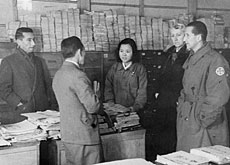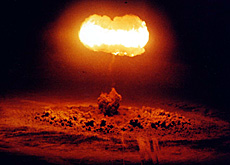Geneva to honour Swiss Hiroshima doctor

Marcel Junod, the first foreign doctor to reach the Japanese city of Hiroshima after it was hit by an atomic bomb 60 years ago, is to be remembered in Geneva.
The Japanese, who marked the Hiroshima anniversary on Saturday, have been honouring the pioneering International Committee of the Red Cross (ICRC) delegate for 15 years.
Geneva is to commemorate Junod, who was the head of the ICRC delegation to Japan in 1945, for the first time on September 13.
The ceremony will include the unveiling of a plaque, which is based on the Japanese memorial to Junod in Hiroshima, erected in 1979.
Since 1990 the Japanese have held an event to pay tribute to the Swiss doctor every June, on the date of his death.
According to Mikimasa Maruyama, the Japanese translator of Junod’s autobiography, Warrior without Weapons, Junod’s work was vital to Hiroshima.
The city was virtually destroyed by the blast and more than 140,000 people died in the bombing and its aftermath. Many of the survivors needed aid and medical attention.
“Marcel Junod’s actions in Hiroshima saved between 20,000 and 30,000 people,” Maruyama told swissinfo.
Junod arrived in Tokyo on August 9, 1945, three days after a United States bomber dropped the bomb on Hiroshima and on the same day that another Japanese city, Nagasaki, suffered the same fate.
The ICRC, which is Swiss-run, says the doctor’s original mission was to check on prisoners of war in camps in the region.
Telegram
He gave the task to a colleague who sent him a telegram on August 30 describing the terrible conditions at Hiroshima.
Junod went straight to the US forces stationed in Japan to ask for medicines and logistics.
He obtained a donation of 15 tons of aid from the head of the forces, General Douglas MacArthur, and a promise to fly the supplies to Hiroshima.
Junod decided to accompany the convoy, taking with him a Japanese radiologist, doctors and US officers.
His son, Benoît Junod, remembers: “My father stayed five days there. It was a totally chaotic situation and he even treated some of the hibakusha, the survivors of the bomb”.
The medications and aid proved to be an important contribution to the city.
“One cannot begin to realise today just how much the arrival of these huge quantities of medications gave hope to those who survived,” said Kiyoshi Eouchi of the Japanese Red Cross Society in Hiroshima.
Witness
After his return from Japan in 1946, Junod started to write a book about his experiences with the ICRC.
Warrior without Weapons was published a year later. According to Benoît Junod, the section about Japan is one of the first accounts of the effects of the atomic bomb on Hiroshima.
“The US had imposed a blackout on this issue. The first US report on the victims of the atomic bomb – written by US journalist John Hersey – dates from September 1946,” Benoît Junod told swissinfo.
For the ICRC, Junod will be remembered as a humanitarian-aid pioneer and for his work with the victims of war.
“Marcel Junod was extremely committed to his work. He joined the ICRC for a temporary mission but ended up being permanently tied to the institution,” said François Bugnion, head of international law and communications at the ICRC. “By his actions he created a model delegate”.
“In this sense all our delegates are Marcel Junod’s spiritual heirs,” said Bugnion.
swissinfo, Akeno Yayama and Frédéric Burnand in Geneva
August 6, 1945: an atomic bomb is dropped in Hiroshima. More than 140,000 die in the bombing and its aftermath.
August 9, 1945: Nagasaki suffers the same fate. More than 70,000 deaths.
In total, Japan estimates that 300,000 people died as a consequence of the bombings, including those who died in later years of its effects.
Marcel Junod was born on May 14, 1904 in Neuchâtel.
After training to be a surgeon, he joined the ICRC in 1935 as a delegate.
From 1935-6 he was sent to Abyssinia and from 1936-9 to the Spanish Civil War. During the Second World War he was active in both Europe and Japan.
In 1947 he published his autobiography, Warrior without Weapons, about his experiences with the ICRC.
He died of a heart attack on June 16, 1961.

In compliance with the JTI standards
More: SWI swissinfo.ch certified by the Journalism Trust Initiative


You can find an overview of ongoing debates with our journalists here . Please join us!
If you want to start a conversation about a topic raised in this article or want to report factual errors, email us at english@swissinfo.ch.